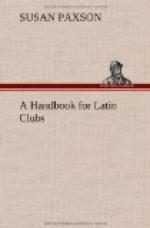—Oliver Herford
CUPID AND THE BEE
Anacreon[5]
Young Cupid once a rose caressed,
And sportively its leaflets pressed.
The witching thing, so fair to view
One could not but believe it true,
Warmed, on its bosom false, a bee,
Which stung the boy-god in his glee.
Sobbing, he raised his pinions bright,
And flew unto the isle of light,
Where, in her beauty, myrtle-crowned,
The Paphian goddess sat enthroned.
Her Cupid sought, and to her breast
His wounded finger, weeping, pressed.
“O mother! kiss me,” was his cry—
“O mother! save me, or I die;
A winged little snake or bee
With cruel sting has wounded me!”
The blooming goddess in her arms
Folded and kissed his budding charms;
To her soft bosom pressed her pride,
And then with truthful words replied:
“If thus a little insect thing
Can pain thee with its tiny sting,
How languish, think you, those who smart
Beneath my Cupid’s cruel dart?
How fatal must that poison prove
That rankles on the shafts of Love.”
[Footnote 5: Anacreon
was a Greek society poet, living in the
sixth century B.C.]
THE ASSEMBLY OF THE GODS
O’er rolling stars, from heavenly stalls advancing,
The coaches soon were seen, and a long
train
Of mules with litters, horses fleet and prancing,
Their trappings all embroidery, nothing
plain;
And with fine liveries, in the sunbeams glancing,
More than a hundred servants, rather vain
Of handsome looks and of their stature tall,
Followed their masters to the Council Hall.
First came the Prince of Delos, Phoebus hight,
In a gay travelling carriage, fleetly
drawn
By six smart Spanish chestnuts, shining bright,
Which with their tramping shook the aerial
lawn;
Red was his cloak, three-cocked his hat, and light
Around his neck the golden fleece was
thrown;
And twenty-four sweet damsels, nectar-sippers,
Were running near him in their pumps or slippers.
Pallas, with lovely but disdainful mien,
Came on a nag of Basignanian race;
Tight round her leg, and gathered up, was seen
Her gown, half Greek, half Spanish; o’er
her face
Part of her hair hung loose, a natural screen,
Part was tied up, and with becoming grace;
A bunch of feathers on her head she wore,
And on her saddle-bow her falchion bore.
But Ceres and the God of Wine appeared
At once, conversing; and the God of Ocean
Upon a dolphin’s back his form upreared,
Floating through waves of air with graceful
motion;
Naked, all sea-weed, and with mud besmeared;
For whom his mother Rhea feels emotion,
Reproaching his proud brother, when she meets him,
Because so like a fisherman he treats him.




